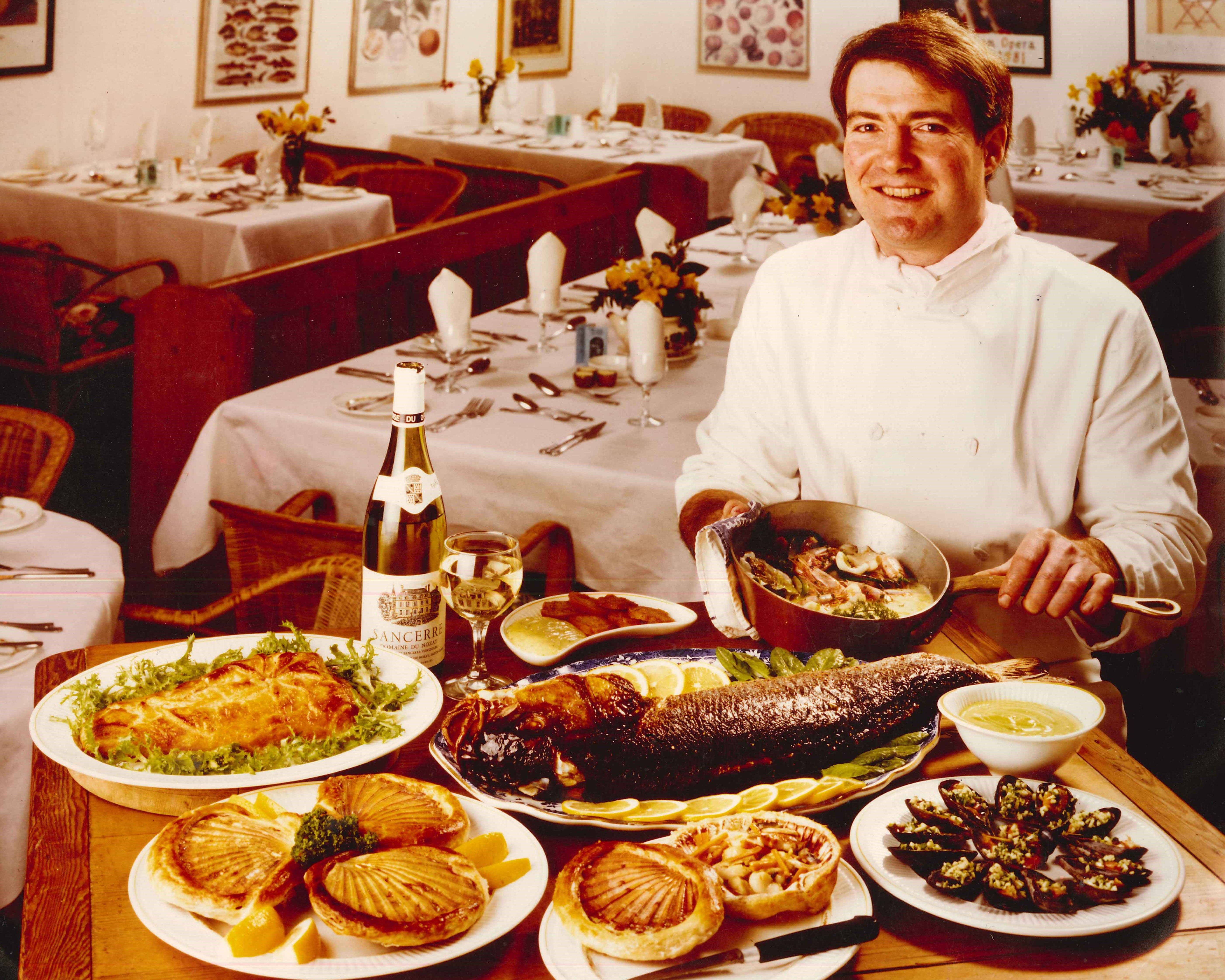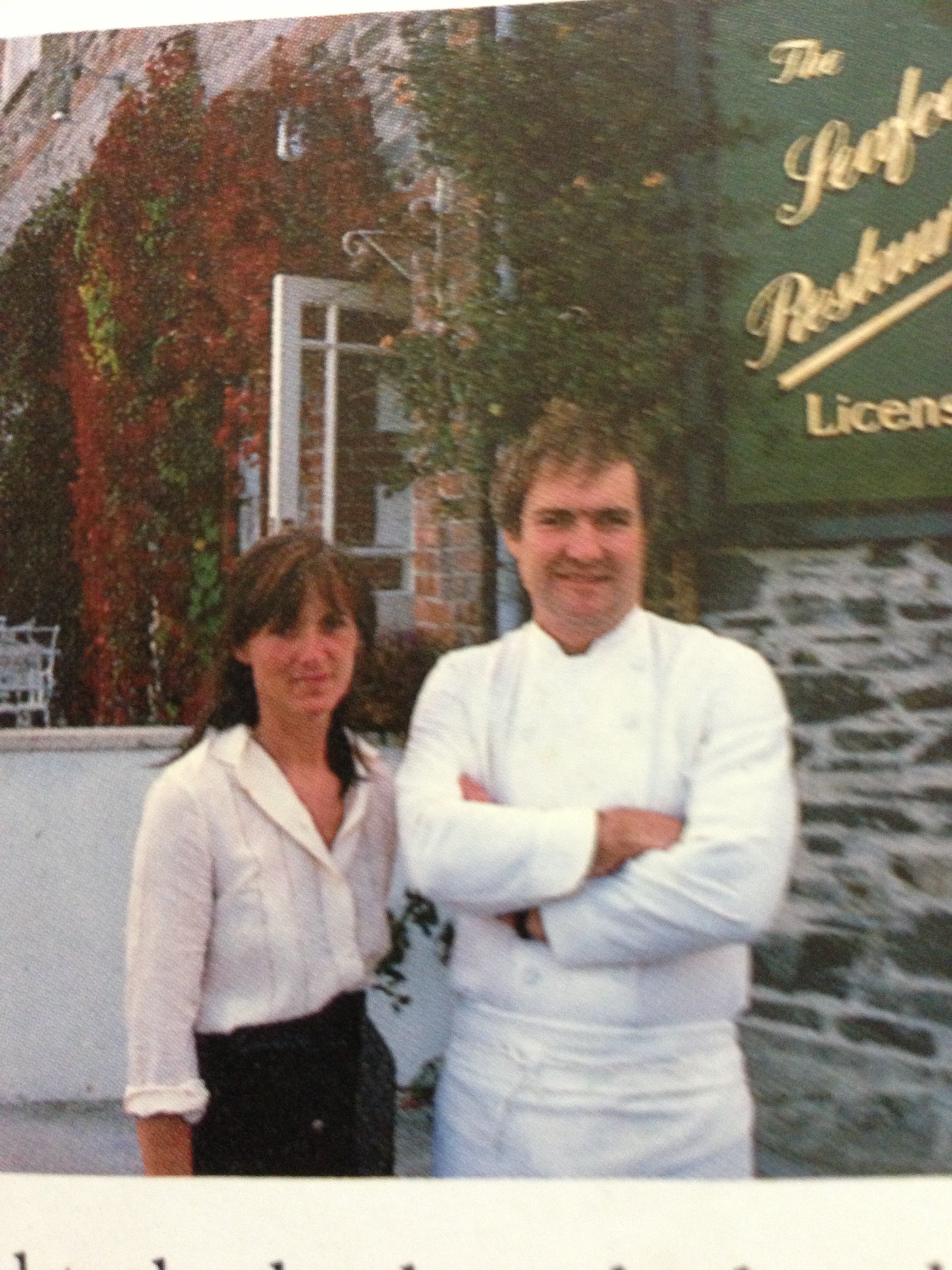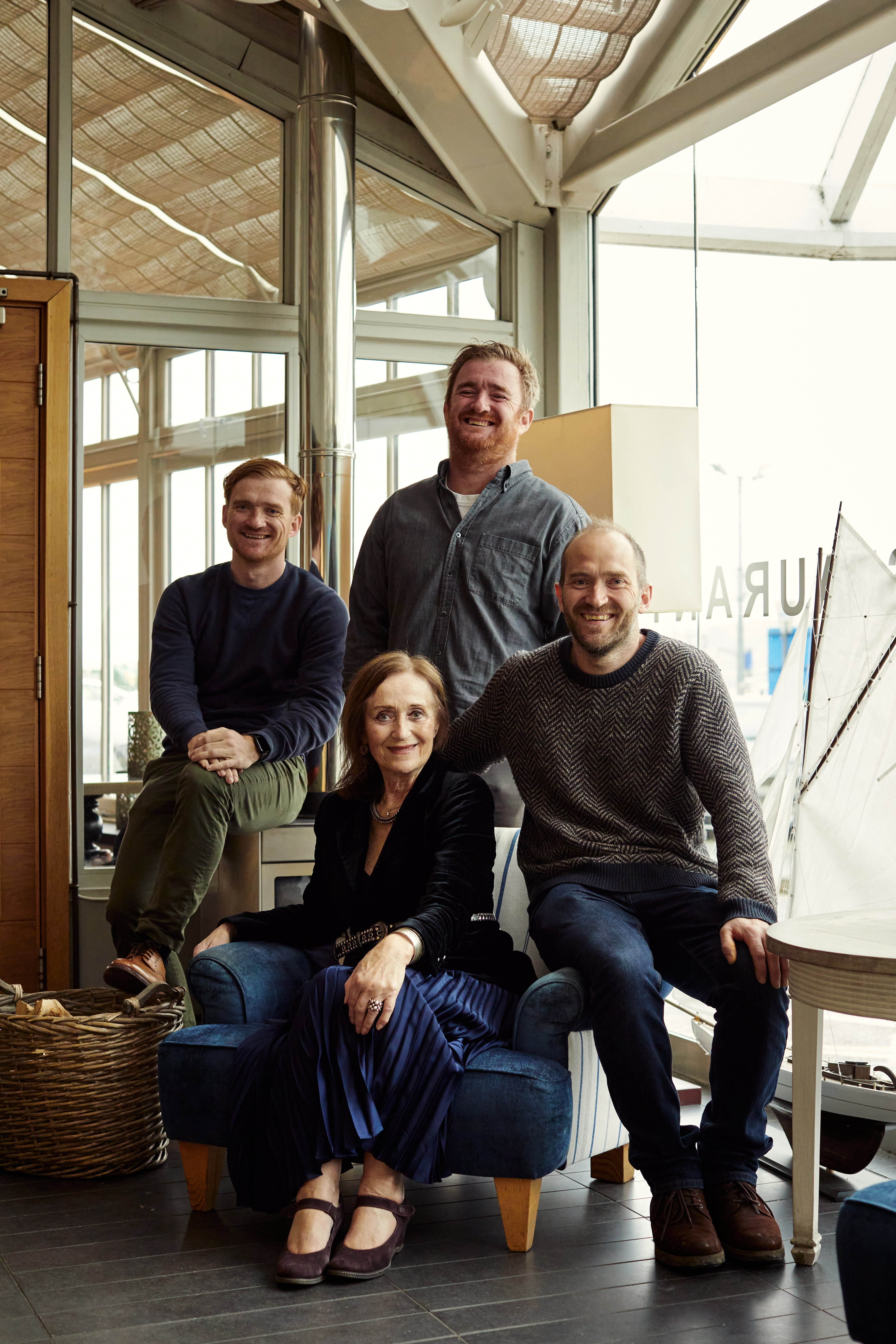Chef Rick Stein: ‘I was accused of ruining Padstow when I just doing my job’
Emma Henderson meets the chef, restaurateur and TV mainstay to mark 50 years of The Seafood Restaurant – turning it from a failed nightclub to a family-run institution that helped put Cornwall on the culinary map, one lobster at a time, whether the locals liked it or not

For the first, I don’t know, 15 years, we were just hand-to-mouth, really. Back then, it was just a job,” says Rick Stein. He’s speaking about The Seafood Restaurant in Padstow, which is celebrating its 50th birthday – a milestone he never expected it to reach. We’re chatting backstage at Cheltenham town hall, ahead of one of his 11 anniversary tour shows across the UK. Despite undergoing lifesaving heart surgery in 2022, there’s little sign of him slowing down. Soon, he’s heading back to Australia, where he lives part of the year with his second wife, Sarah, and will be filming a new TV series.
Stein admits that he never meant to open a restaurant at all. “I didn’t want to be a chef, it just happened accidentally,” he says. He points to a hessian tote bag in the dressing room embroidered with a purple tiger – the name of his mobile disco in the Seventies. He and a friend had opened a nightclub in Padstow after graduating from Oxford, but booze-fuelled brawls led to police shutting it down. Having bought the building, he needed to do something with it. So, in 1975, with Jill Stein – his first wife, whom he met in Padstow – they opened The Seafood Restaurant.
Even now, Jill and Rick remain at the helm. Though they divorced in 2007, they’ve continued to run the family business together. Each of their three sons now has a role in the Rick Stein Group: Ed, the eldest, handles the design and interiors, Jack is the chef director, and Charlie oversees wine and spirits. “Food, hospitality and the dinner table have been a kind of currency in our family,” says Charlie. “It is everything.”
The brothers have big ambitions. “We want to create a generational hospitality business and take it into the next 50 years,” Charlie adds.
A week after the Cheltenham show, I visit The Seafood Restaurant and speak to Jill and Jack on an overcast Monday morning. “The police closing us down was the best thing that could have happened. It was a sliding doors moment,” Jill says of the nightclub days.
She managed the restaurant for 30 years, and in 2014 was awarded an OBE for her contribution to the hospitality industry. Now she focuses on interiors. “It’s my life, and has been for so long, I don’t know what I’d do without it,” she says. Like many family businesses, it hasn’t always been easy, “but when the chips are down, everybody’s on the same page”. As the only woman in the family, she admits, it can be “bloody difficult” at times.
The Rick Stein Group has six restaurants in Cornwall: The Seafood Restaurant, St Petroc’s Bistro and Stein’s Fish & Chips (plus a cookery school and four shops) in Padstow; The Cornish Arms in nearby St Merryn; and Rick Stein Fistral in Newquay. There are also outposts in Barnes, Sandbanks, Marlborough and Winchester, making 10 eateries in total.

Despite his success, Rick never trained formally as a chef. Apart from a bar stint in a London hotel kitchen and some knife-skills classes at a local college, he learnt on the job. His cooking has become synonymous with simple fish dishes using Cornish produce: Indonesian seafood curry, whole Dover sole with noisette butter, fruits de mer... Michelin stars were never the goal; instead, the focus was always on sourcing locally, cooking with the seasons, and making the most of what was available.
“In 1975, a lot of the ingredients you can now get anywhere in the UK were difficult to get hold of,” he says. “If I wanted mussels, I’d pick them off the rocks at Harlyn or Booby’s Bay. I also grew herbs in my garden on Trevose Head.” He wasn’t doing it because it was trendy – he did it because he had to.
The restaurant also helped change how Brits saw seafood. “Dad wanted to change the eating culture of our country towards seafood,” explains Charlie. At the time, most people bought tinned sardines or ate kippers and fish and chips – fresh seafood was rarely on the menu.

During the early days, Jill and Rick had to drum up business however they could. “Rick and I would go around the campsites with a loud-hailer saying, ‘Come to the seafood restaurant,’” Jill recalls. “It was word of mouth mostly. Journalists didn’t want to come to Cornwall, but once Rick did his first book in seafood cooking [in 1988], that started to change.”
TV came soon after. In 1995, Rick debuted Taste of the Sea, a series that brought Cornwall into the homes of middle Britain. It was an ode to the sea – life on fishing boats, restaurant kitchens and coastal ingredients. It also introduced viewers to Chalky, his beloved Jack Russell, who would become a fixture in later series.
Jack remembers the first series vividly. His dad “brought lobster and chips back, and we had a bottle of champagne. We’d never really had that to eat at home.” At school, everyone watched the show. “Dad used words like ‘wizard’, which means ‘good’. So I did get a bit of stick for that.”
What Rick and Jill sparked in 1975 was a new way of seeing Cornwall. They helped pioneer the idea of a destination restaurant, showing how special its little fishing villages could be. Without The Seafood Restaurant, chefs like Nathan Outlaw – who worked there in the late Nineties – might not have followed suit.
“I was a young chef who’d had enough of London and wanted to learn about seafood cookery. Rick Stein was the name – and still is,” Outlaw tells me. “It was an amazing opportunity for me and I’ll always be grateful for it.”

Others followed, too. Paul Ainsworth opened several restaurants nearby, and Katie and Rick Toogood brought their Prawn on the Lawn concept down from London to Padstow to be closer to the source of their seafood.
As the Stein family expanded their footprint in the town, Padstow earned the (not entirely affectionate) nickname “Padstein”. The attention helped drive tourism, especially once Rick’s TV presence started getting “bums on seats”, as he puts it.
But it wasn’t all applause. “I remember about 25 years ago, I went to Newlyn to open the fish festival and this woman stopped me in the car park, and said, ‘I hope you’re not coming to ruin Newlyn, like you ruined Padstow!’” he says. “It’s a bit tough being accused of ruining something when you’re just doing your job.”
Though he acknowledges the impact he’s had, there’s no arrogance about it. “I think tourism would have developed without me anyway,” he says. Though “it might not have been quite so intense”. Padstow’s charms were never going to stay secret for ever – if not in the Eighties, then social media would have done the job.
Besides, as one of the poorest counties in the UK, tourism is Cornwall’s economic lifeline. With its mining heyday long gone and the fishing industry depleted, bigger hospitality businesses like the Rick Stein Group help provide year-round employment.
I remember about 25 years ago, I went to Newlyn to open the fish festival and this woman stopped me in the car park. She said, ‘I hope you’re not coming to ruin Newlyn like you ruined Padstow!’ It’s a bit tough being accused of ruining something when you’re just doing your job
John Buckingham, an 89-year-old former greengrocer and lifelong Padstow resident, puts it simply: “Think not what The Seafood Restaurant has done for Padstow, but what Padstow has done for The Seafood Restaurant. It has been a partnership.”
The Rick Stein Group hasn’t reached its 50th year without criticism. In 2023, it came under fire for charging ?2 for condiments like mushy peas, curry sauce, tartare sauce and flavoured mayonnaises, a reaction to rising food and energy costs.
Others have also rebuked the chef for his recent TV series, Rick Stein’s Cornwall, with critics claiming it would drive up house prices and second-home ownership. But the show also celebrated local producers, artists and craftspeople. Still, Padstow’s housing reality is stark. “Most of the buildings in Padstow have remained the same,” says Buckingham, but “the houses and cottages, once full of families, have mostly become holiday lets.”
Not everyone is a fan. A fisherman in Porthleven – where a Stein restaurant briefly operated – said the restaurant never bought fish from him. The business says it sources from Newlyn fish market to meet demand across all its sites.
Despite all this, The Seafood Restaurant itself hasn’t changed dramatically: the kitchen is larger, there are more rooms and the team has grown. “I’d say some of the dishes have changed a little bit,” says Jack. “But not much.”
.jpeg)
Rick may no longer be in the kitchen, but no new dish goes on the menu without his approval. “You just have to put it in front of Rick, and he has to taste it,” Jack explains.
I’m talking to Jill and Jack just ahead of April’s employer’s national insurance increase, which is set to hit businesses hard. “The whole industry is pretty used to dealing with these things,” Jack says. Surprisingly, he seems fairly relaxed about it, despite it “probably costing us about ?600k”. It’s just another blow added to the onslaught of the past few years. “When Covid hit, we had about three weeks’ worth of money in the bank before we’d go bust,” he says. They agree they’ll have to find ways to make cuts to make the new changes work.
And there are more plans ahead. Ed and Jill are working on adding rooms above The Seafood Restaurant, and there’s talk of opening a more casual site in central London – though nothing is confirmed yet.
Despite all “the ups and downs of the past 50 years, including the 2008 recession, [which] was really hard, and Covid, when we nearly lost the restaurant”, Rick says that if he were in his twenties or thirties today, he’d still open a restaurant. Though he’d likely go down the pop-up route to avoid huge rents.
So, what’s the secret to reaching 50 years? Along with the incentive of knowing his sons want to take over the business, his attitude towards hospitality is a wholesome one, and is reminiscent of why Brits love going out to eat so much. “I really enjoy serving people nice food and seeing the reaction and making people happy. My wife’s friend, [comedian] Barry Humphries, once said something like, ‘It’s been the greatest thing in my life to be in the cheering up business.’ I think that’s exactly the same in restaurants, really. It’s just a nice thing to do, to get people eating together and forgetting some of their troubles.”



Join our commenting forum
Join thought-provoking conversations, follow other Independent readers and see their replies
Comments